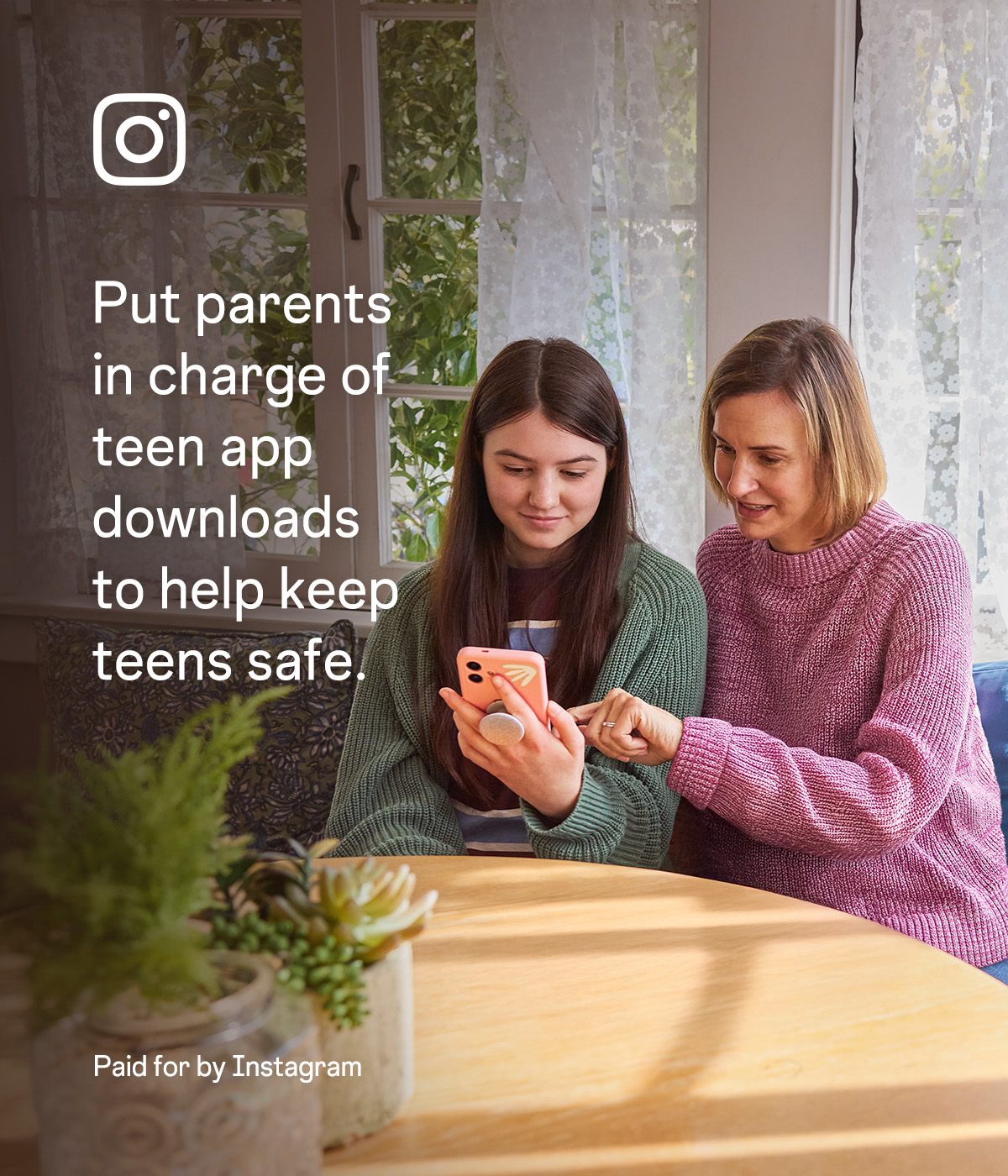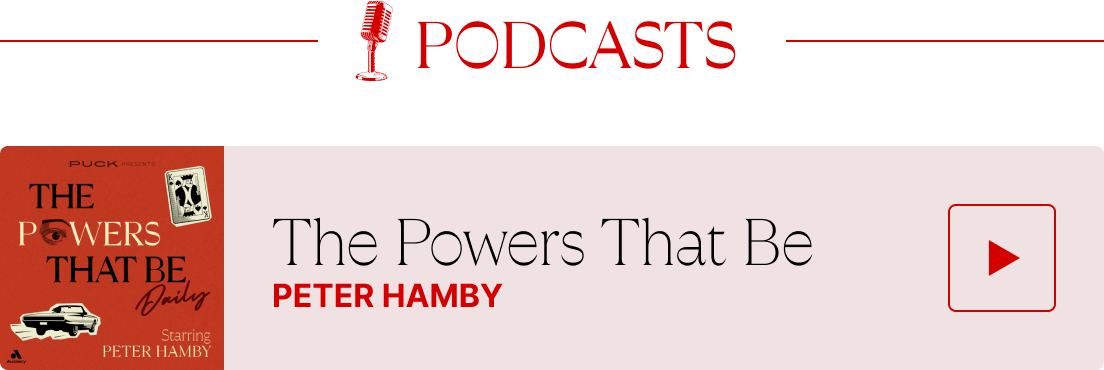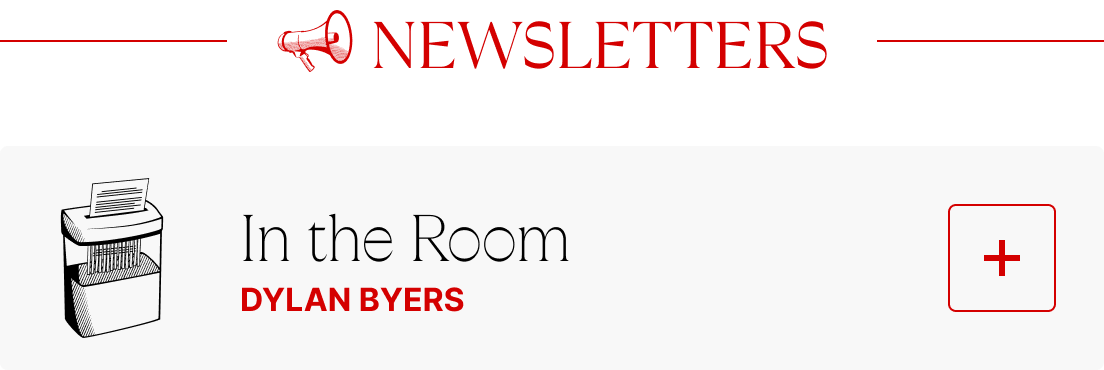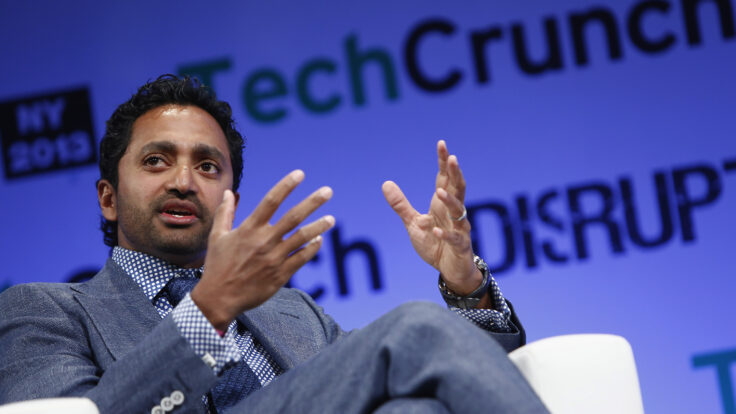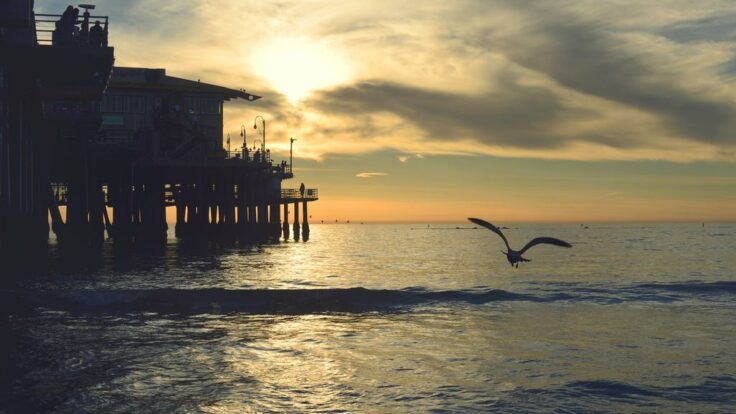Hello, and welcome back to The Best & The Brightest. It’s NatSec Thursday, and
because it is also the day after Puck’s third annual First Amendment soirée at the French ambassador’s residence here in D.C., I am your mildly hungover host, Julia Ioffe.
In tonight’s issue, news and notes on J.D. Vance’s deeply personal animus toward Europe’s leadership, the origins of the isolationism that was on full display in the Signal group chat, and why Ukraine is the nexus where all the threads of his worldview come together.
|
|
|
App store parental approval can keep teens safe online.
Today, teens can download any app – even ones parents don’t want them to. Federal legislation that puts parents in charge of app downloads could change that, helping keep teens safe.
That’s why Instagram supports federal legislation requiring app store parental approval and age verification for teens under 16.
Learn more.
|
|
|
But first, a few updates from the Hill…
|
|
|

|
Abby Livingston
|
|
- Stefanik
signals: The White House’s remarkable decision to pull Elise Stefanik’s nomination as United Nations ambassador signals weakness on two fronts for House Republicans. First, and most obviously, Mike Johnson is dealing with an incredibly narrow margin and can’t afford to lose her vote while awaiting a special election. Second, and more ominously, Republican leadership seems genuinely worried that they could lose her seat to a Democrat
in a district Stefanik previously won by almost 25 points.
Earlier today, the Trump team informed Stefanik that they needed her to stay on the Hill, in part because the Florida special election on Tuesday to fill National Security Advisor Mike Waltz’s seat is looking much closer than it should be for a Trump +30 district. Multiple Republican sources say that Republican state senator Randy Fine, who’s running for the Florida seat, is a
terrible candidate. Waltz, who is already embroiled in Signalgate, is now the subject of additional fingerpointing for not doing enough to shore up his district.
Anyway, the White House told Stefanik’s team that they don’t want to take any chances on another special election, two people familiar with the conversation told my partner Leigh Ann Caldwell. Trump offered similar reasoning on X this afternoon. But the timing is perplexing: It’s unclear why the White House didn’t wait until next week—after the results of the Florida special—to pull Stefanik’s nomination.
It’s a mixed bag for Democrats, who can take heart from the Republican panic but were looking forward to this special election. Stefanik’s North Country district has been safe Republican territory for a decade, but it voted Democratic in the not-so-distant
past. The district shares a border with Canada, so it’s uniquely sensitive to the economic and cultural effects of Trump’s trade war, and Democrats are optimistic that the money Blake Gendebien is raising indicates that voters’ discontent with Trump might already be at tipping point. No fundraising figures have been announced yet, but we’ll have a better sense of things after Gendebien files his F.E.C. report sometime after March 31.
- Primary
time: Meanwhile, the hottest topic in the Windy City over the past few days has been the news that Rep. Jan Schakowsky, an 80-year-old incumbent, had drawn a primary challenger: Kat Abughazaleh, the progressive Gen Zer who had a banner first day, raising more than $200,000 and receiving national coverage of her
campaign launch. However, on the ground in Chicago, Democratic operatives are deeply skeptical of a candidate parachuting into the district. (She moved to Chicago proper last year, last voted in D.C., per Politico, and has yet to establish residency within the actual district lines).
Of course, carpetbagging has a rich history—many candidates who either weren’t born in a district (but established roots over time), or who live narrowly outside of district lines, have ended up
winning their contests, but it is usually an incredibly difficult obstacle to overcome. In any case, it seems inevitable that a candidate with deep local ties will jump into the race, and Schakowsky, herself, has yet to announce her plans. But as we’ve seen before, when too many upstarts enter the mix, incumbents often end up coasting to victory given the diluted anti-incumbent vote.
|
|
|
Depending on whom you talk to, J.D. Vance is either a foreign policy
naif or an embittered War on Terror vet driven by fear that the West’s foundational civilization is being washed away. The truth may be somewhere in between.
|
|
|
Even in private conversations, or what he assumes are private conversations, Vice
President J.D. Vance can’t resist sticking it to the Europeans. Buried in the now-public treasure trove of Signal messages on the “Houthi PC small group” chat, Vance offered a strange criticism of
Donald Trump’s decision to bomb the group in Yemen. The strike would be a “mistake,” he said—not because he was an isolationist who didn’t want the U.S. to get bogged down in yet another conflict, but rather because reopening the Red Sea trade route would benefit Europe more than America. “3 percent of U.S. trade runs through suez [sic]. 40 percent of European trade does,” he wrote. “I am not sure the president is aware how inconsistent this is with his message on
Europe right now.”
Vance has become the most acerbic messenger of Trump’s view that Europe has taken advantage of American taxpayers by not investing enough in its own defense. But if the president loathes what he perceives as the Europeans’ almost effeminate weakness—especially compared to Putin’s machismo—Vance’s contempt for the continent’s leadership seems deeper, and more ideological. In February, the vice president shocked Europeans at the Munich Security
Conference when he scolded them for not spending money on their own defense, and for preaching about democracy while, in Vance’s view, censoring far-right speech and dismissing voters’ concerns about unchecked migration.
|
|
|
States are taking action to protect teens online. Congress should, too.
Today, teens can download any app – even ones parents don’t want them to. Federal action putting parents in charge of teen app downloads can help keep teens safe online.
Twelve states are considering legislation requiring app store parental approval and age verification. It’s time for Congress to do the same with federal legislation.
Learn more.
|
|
|
It wasn’t just public posturing. It was, as the group chat seems to confirm, the
real Vance. Even when national security advisor and group chat administrator Mike Waltz gently corrected the vice president—“the trade figures we have are 15% of global and 30% of container,” he wrote, arguing that it’s “difficult to break that down to U.S.” trade—Vance wouldn’t let it go. “@Pete Hegseth if you think we should do it let’s go,” he said. “I just hate bailing out Europe again.” (“I fully share your loathing of European free-loading,”
Hegseth conceded. “It’s PATHETIC.”)
People familiar with Vance’s foreign policy preferences agreed that those private messages are an accurate reflection of his worldview. It’s clear enough that Vance’s team, as one source familiar with their thinking said, believe that “the Europeans are freeloaders.” But these sources also pointed to deeper roots for this hostility, a mix of post–War on Terror disillusionment and a reverence for “traditional” Western culture that has fueled Vance’s
disdain toward America’s oldest allies.
|
There are two schools of thought about Vance’s isolationist foreign policy views. To
some who witnessed his quick ascent into the Senate and then onto the ticket, Vance is a cynical climber with few core convictions. “He doesn’t believe in anything,” one Republican Senate source told me. “He will do whatever it takes to climb the greasy pole”—or, as this person put it, to “prove to Trump that he is his number one son.”
But others instead see a picture of an ambitious and very online young man—he is, after all, only 40—who groped his way to a set of views that have
recently deepened into something darker and more dogmatic than the transactional, non-ideological vision that guided Trump I. “He’s shape-shifted a lot of times, but has attracted a lot of types who are more ideological, more deliberative in wanting to blow things up,” said one Republican foreign policy insider. “He knows very little about foreign policy, and he’s very easily influenced,” one Senate Democrat who worked with Vance told me.
Among the people who have shaped Vance’s views are
Patrick Deneen, a philosopher of the new, post-liberal right; Elbridge Colby, an isolationist currently nominated for undersecretary of defense for policy; Orthodox Christian conservative writer Rod Dreher; and Hungary’s Viktor Orban. The Hungarian autocrat, according to several sources I spoke to for this story, has become a frequent Vance interlocutor and a
profound influence on the vice president’s thinking.
Taylor Van Kirk, the press secretary for the vice president, issued a statement in response to questions about Vance’s politics. “Anybody can learn about the vice president’s longstanding, consistent foreign policy views with a quick Google search,” she told me. “Thankfully, very few people will become misinformed about them by reading this stupid article because almost no one subscribes to this garbage
outlet.”
The seminal foreign policy event for members of Vance’s generation, myself included, was 9/11 and George W. Bush’s response: two messy and morally ambiguous wars that cost a fortune and didn’t crown the United States in glory. In 2003, during the first few months of the Iraq War, Vance enlisted in the Marines right out of high school. He was a
public affairs officer and—ironically, given his current hostility toward the media—served as a combat journalist on one deployment to Iraq. In the universe of the Marine Corps, he also faced some important
distinctions that likely left him with a chip on his shoulder. The first was an issue of class: He was an enlisted officer, unlike the commissioned officers who are college graduates and generally from higher socioeconomic strata. The second was a matter of duty: He was not in the infantry, the more prestigious and valorized cadre.
There is now a whole generation of Millennial Iraq and Afghanistan veterans on both sides of the aisle in American politics. Most of them came away deeply
disillusioned by the wars, but for many on the Republican side, it made them take a hard right turn. “The basic feeling is: We were all sold a bill of lies,” a former senior Senate Republican aide explained. “They feel that the U.S. government wasted billions of dollars, the lives of all our friends, and our mental health—and what did we get out of it? Imagine what we could’ve had if we minded our own business and invested that money at home.”
These are the Waltzes, the Hegseths, the
Dan Crenshaws, and the J.D. Vances. To these veterans, the Cold War—with its emphasis on transatlantic alliances and hostility to Russia—is an anachronism. The Global War on Terror, or GWOT, offered a more pertinent lesson about the dangers of American overreach. “That’s why they want to reform the Republican Party,” said the G.O.P. aide. “That’s why they hate neocons. That’s why they want to burn it down, why they hate the deep state, why they distrust the government. I think
they did once trust when they were 19 and they signed up.” I asked this source why Vance seems to hate supporting Ukraine so much. “In its essence, it’s a reaction to Afghanistan and Iraq,” the aide explained. “And they can only think of Ukraine through that lens.”
|
Ukraine, for this cohort, is a distraction from the larger issue: the future of Western
civilization, the heart of which is old Europe. “Yes, they annoy me sometimes,” Vance told Fox News’s Laura Ingraham earlier this month of the Europeans. “But you have to remember that this is the cradle of Western civilization. The entire idea of Christian civilization that led to the foundation of the United States was formed in Europe.”
|
|
|
Europe, in Vance’s view, is not just a place but a
civilization—one based on a “culture” that needs protection from the hordes of barbarians at the gates. When European countries accept millions of immigrants “from countries that are totally culturally incompatible,” as Vance said in that Fox interview, the continent is at risk of “civilizational suicide.”
In this view, Europe is a civilizational archive of a proto-American culture rather than a mix of real and dynamic societies—a museum rather than a home. For Vance and his
foreign policy team—led by his longtime aide Andy Baker, a Berkeley and Oxford grad who spent 15 years in the U.S. foreign service—Europe is the land of the great books and the Western canon, of the Greco-Roman ruins and the Catholic church (to which Vance is a recent convert), of monuments, battlefields, and cultural artifacts. (The White House declined to make Vance or Baker available for an interview.)
Some scholars have noted that this kind of idealized view of Europe
is one that’s held most fervently at the continent’s periphery, and rarely reflects Europe’s reality. One could argue it’s why Ukrainians are fighting so hard to join Europe—or what they think of as Europe—at a time when Europeans themselves seem unwilling to die for it. Or why American right-wingers, who see themselves as the westernmost edge of that European-centric Western world, are so hung up on a totally different ideal of Europe, as well as on their sense of betrayal by the elites at the
heart of the cultural empire.
Hence their sympathy for the far-right figures—in Germany and Italy in the core of Europe, in Hungary and Russia on its eastern flank—they see as defending that culture. “They see common cause with the AfD, with Orban, with [Italian Prime Minister Giorgia] Meloni, and with Russia,” said the source familiar with the thinking of Vance’s foreign policy team. “They’re not put off by the authoritarianism.” To them, Russia is not
only the land of Dostoevsky, Tolstoy, and other pillars of our shared Western civilization. It is also part of that constellation of revanchist, revisionist European powers—one that is loudly propagating a militant, non-reformed Christianity, traditional gender norms, and the most toxic kind of masculinity. “This is the Western civilization they want to be part of,” the source said.
It is also why they feel that Russia should rejoin
the European community—and why they don’t see how its invasion of Ukraine should be an impediment. In February 2023, a mere month after being sworn into the Senate, Vance made a startling comment about Ukraine at a private Republican lunch, according to one attendee: It’s mostly ethnic Russians anyway. Why, he asked, are we so focused on Eastern Ukraine? Vance went on to spend his brief tenure in the chamber voting “no” on every Ukraine aid bill he could. “He shits all
over Ukraine,” the Senate Democrat told me. Several sources told me that he apparently believes in and peddles conspiracy theories about Ukraine, ones that seem like Russian propaganda. In private, he has told people he believes there are real Nazis in Ukraine, a Putin talking point for over a decade. In public, Vance has repeated the Russian-made falsehood that Ukrainian ministers spent American aid dollars on a luxury yacht.
Ukraine is where the various strands of Vance’s worldview come together—his sympathy for Russia, his irritation with European elites who let in migrants and support Ukraine, and his instinctive distaste for American projects overseas. Days before Russia
launched its full-scale invasion of Ukraine, Vance, then a candidate for Senate, was clear. “I gotta be honest with you,” he said. “I don’t really care what happens to Ukraine one way or another.” The source familiar with his foreign policy team’s thinking updated this perspective. “They want to compartmentalize Ukraine and bring Russia
back into the Western community,” this person said, “because that’s where they feel they belong.”
|
That’s all from me, friends. Enjoy your weekend, even if tomorrow will be
worse.
Julia
|
|
|
Join Emmy Award-winning journalist Peter Hamby, along with the team of expert journalists at Puck, as they let you
in on the conversations insiders are having across the four corners of power in America: Wall Street, Washington, Silicon Valley, and Hollywood. Presented in partnership with Audacy, new episodes publish daily, Monday through Friday.
|
|
|
Ace media reporter Dylan Byers brings readers into the C-suite as he chronicles the biggest stories in the
industry: the future of cable news in the streaming era, the transformation of legacy publishers, the tech giants remaking the market, and all the egos involved.
|
|
|
Need help? Review our FAQ page or contact us for assistance. For brand partnerships, email ads@puck.news.
You received this email because you signed up to receive emails from Puck, or as part of your Puck account associated with . To stop receiving this newsletter and/or manage all your email preferences,
click here.
|
Puck is published by Heat Media LLC. 107 Greenwich St, New York, NY 10006
|
|
|
|








